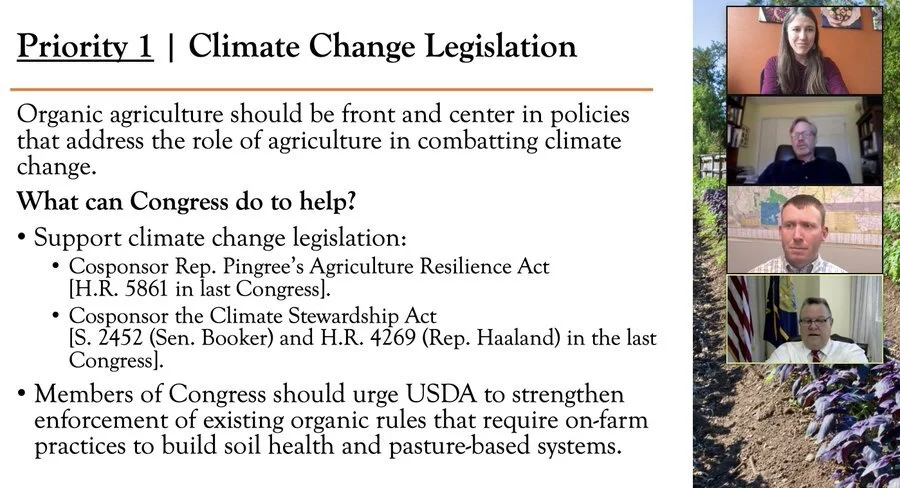NOC Meets with 53 Congressional Offices to Advance Organic
Last week, 44 organic farmers, scientists, policy advocates, and organic company representatives from across the country met with over fifty Congressional offices to urge action on key organic priorities. NOC members were thrilled with the progress we made with key Congressional offices, Democrats and Republicans alike, to advance organic. Key outcomes included:
Climate Change: Many Congressional offices understood that organic operations have been early adopters of climate-friendly practices like cover cropping and crop rotations due to the strict soil health requirements in the organic regulations. Congressional offices joined NOC in recognizing the need to reward organic farmers and other early adopters, while at the same time calling on the USDA National Organic Program to ensure that the strict soil health provisions and pasture rule requirements in organic are adequately enforced. Several members of Congress committed to communicate with USDA to make sure that enforcement is happening as it should.
Racial Equity: NOC celebrated the introduction of the House companion to the Justice for Black Farmers legislation and gathered a list of 15 Senators and Representatives who expressed interest in co-sponsoring this legislation. NOC called on Congress to support USDA’s work in tackling a legacy of discrimination.
Unfinished organic rules: More than 25 Senators and Representatives said they would urge USDA to finalize the Strengthening Organic Enforcement and Origin of Livestock rules and reinstate the Organic Livestock and Poultry Practices rule.
Restoring Organic Certification Cost Share – NOC communicated about the damaging impact of cost share cuts in August of 2020 and NOC has asked key allies to communicate directly with USDA about restoring funding. And NOC has begun conversations with key allies about the need to boost cost share reimbursement rates in the future.
Appropriations Priorities – Several Congressional office are eager to support our appropriations requests, which include:
boosting funding for the USDA National Organic Program, with a focus on enforcement of organic standards, including soil health requirements in organic.
increasing the Sustainable Agriculture Research and Education (SARE) Program to $60 million annually and the Organic Transitions Program to $10 million annually, with a focus on using the increase to fund climate change research related to organic agriculture.
fixing the funding shortfall for the Organic Certification Cost Share Program if USDA does not restore funding.
allocating additional resources for public plant and animal breeding programs so farmers have seeds and animal breeds regionally adapted to their farming systems, soils, and changing climates.
ensuring $3 million in funding for the NASS Survey for Tenure, Ownership, and Transition of Agricultural Land so USDA can produce a robust analysis leading to better access and more secure land tenure for young and socially disadvantaged farmers alike.
“The organic community is thrilled to see Congress and USDA prioritize carbon sequestration and focus on reducing greenhouse gas emissions from agriculture,” said Scott Myers, Owner/Manager of Woodlyn Acres Farm in Dalton, Ohio and 2021 fly-in participant (Woodlyn Acres is also a member of the Ohio Ecological Food and Farm Association). “Soil is the foundation of organic agriculture. Organic regulations require farmers to use soil building practices, like cover cropping, careful tillage, and crop rotations, which help to sequester carbon. Organic agriculture should be front and center in any discussion about policies to incentivize climate-friendly farming.”
NOC members meet with Senator Tester (MT) and his staff
“Consistent enforcement of organic rules is vital,” said Aimee Simpson, Director of Advocacy & Product Sustainability at PCC Community Markets, the nation’s largest community-owned food co-op, based in Seattle, WA. “Organic consumers need assurance that the products they purchase with the USDA organic seal are in fact produced using the strict practices required by the organic regulations to protect the environment and human health.”
NOC Members meet with Representative Delgado (NY) and his staff


